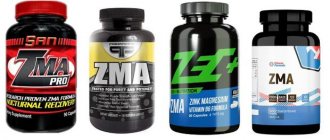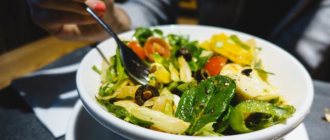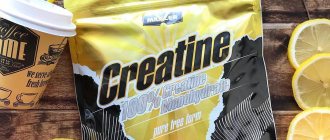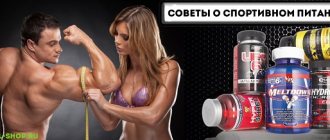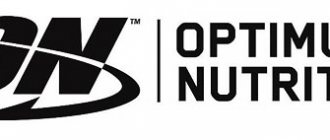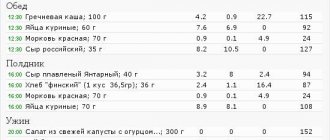Good day. I am again glad to welcome you to my sports page. Do you know the role of microelements in the metabolism of any organism? – I think so, because we live in the information age. But for an athlete they are also super important because they are an integral component on the path to success.
Today I would like to tell you about such an important chemical element as zinc, its role for an athlete and the problems that arise when it is deficient. And also how to take zinc for bodybuilding.
More interesting articles for chemists:
APPLICATION OF GROWTH HORMONE IN BODYBUILDING. SOMATOTROPIN – IS IT WORTH GROWING WITH CHEMISTRY, LIKE YEAST?
HOW TO TAKE MILDRONATE IN BODYBUILDING AND WHAT IS IT NEEDED FOR?
SUSTANON IN BODYBUILDING: WHAT IS IT AND WHAT IS IT NEEDED FOR. THE TRUTH ABOUT STEROIDS
SOMATOTROPIN: GROW BIG AND STRONG!
What is the function of zinc in the body
Despite the very small need for the body, this microelement plays a very important role, especially for an athlete. The daily dosage of zinc is 15 mcg according to WHO recommendations.
The main functions of zinc in the body are:
- takes part in the body’s immune defense (part of the leukocyte cell, does not allow viruses to multiply in cells);
- necessary for rapid wound healing;
- participates in the synthesis of collagen in skin, hair and nails;
- plays an important role in the synthesis of enzymes, protein, carbohydrates, lipids and deoxyribonucleic acid (DNA);
- necessary for normal hormone synthesis (especially testosterone and thyroid gland).
Zinc can be obtained from high-quality natural products such as meat, some vegetables and fruits (seafood, seaweed, pears, nuts).
The role of Zn30 in the vital functions of the main body systems
Many people underestimate the importance of a balanced diet. Our diet should include all the vitamins and minerals necessary for health. Without microelements such as zinc, calcium, iron and magnesium, the proper functioning of internal organs is impossible.
The problem of an incomplete menu is especially relevant for athletes. With increased physical activity, accelerated wear of bone tissue and muscle hypertonicity occurs. To restore and maintain health when performing strength exercises, you need the entire complex of minerals.
For example, zinc. The content of this metal in our body is at least 1.5 grams. Most of it is in bones (about 50%) and skin (20%). Zn can also be detected in blood (leukocytes, red blood cells), male sperm and the prostate gland.
What functions does zinc perform:
- synthesis and breakdown of carbohydrates, fats, proteins;
- activation of leukocytes necessary for wound healing and increasing the body's resistance;
- production and excretion of insulin from the body;
- supporting the normal functioning of the endocrine system (hormone production);
- cell division and growth.
And this is not a complete list of the beneficial qualities of a microelement important for health.
https://youtu.be/fdnzZhbVej8
How to replenish zinc deficiency for athletes
Modern products often do not contain the required range of vitamins and mineral elements, and to avoid deficiency in the body, you need to take special dietary supplements. During strength training, the body spends a large amount of zinc, which must be replenished. The zinc requirement for an athlete-bodybuilder increases to 30 mcg, and during competitions to 35 mcg.
Zinc can be part of complex dietary supplements, or it can be sold as a single drug - Zincteral. Within 2 hours after taking the tablet, the level of zinc in the blood increases. Excess is excreted through the intestines, sweat glands and kidneys. This microelement can accumulate in the liver, pancreas, kidneys, prostate, leukocytes and red blood cells.
According to the instructions, a Zincteral tablet is taken 1 hour before a meal or 2 hours after a meal, and if you have problems with the gastrointestinal tract, you can take it with meals.
Before prescribing the drug, it is necessary to conduct a laboratory test that will reveal zinc deficiency in the body, after which the doctor will select the correct dose of the drug for you. During treatment, the dose may change.
In case of an overdose of the drug, the following may occur:
- symptoms of dyspepsia (nausea, vomiting, heartburn, metallic taste in the mouth);
- headache and dizziness;
- blood disorders (decreased number of neutrophils, anemia).
When to suspect zinc deficiency
The combination of a number of symptoms should lead you to think about a lack of zinc in the body. These include:
- decreased immunity;
- anemia;
- weakness and fatigue;
- hair loss and brittle nails;
- decreased potency and libido in men;
- slow growth of muscle mass.
If you notice a number of the listed symptoms, you should consult with your club’s sports doctor.
There are many arguments for increasing your zinc intake. But how high is a person's daily zinc intake really? However, anyone who regularly trains for strength training or other sports not only has an increased need for zinc itself, but also loses some zinc in the body. Therefore, supplemental zinc intake can be very beneficial for strength training athletes.
But what can you expect from zinc supplements? The thing is, if you look at the current research results, disappointment sets in very quickly. It is clear that higher zinc intake does not have a positive effect on testosterone balance and therefore not on our strength training performance. Therefore, the idea of gaining strength noticeably by increasing your zinc intake can be put aside very quickly. Additionally, you need to be careful because too much zinc in the body can interfere with the absorption of other micronutrients such as iron.
The role of zinc for female athletes in early pregnancy
As already mentioned, during sports, the body’s need for zinc increases sharply. If a woman, while in the early stages of pregnancy, continues to exercise in the gym, then the need for additional amounts of zinc increases even more.
If this is neglected, there is a risk of the fetus developing a number of anomalies in the nervous and genitourinary systems.
Pregnant women can be advised to take Chinese dietary supplements. This is not a drug and its composition is completely natural (chicken egg white, zinc lactate and glucose). It is recommended to take them with meals in a dosage of 3-4 capsules 2 times a day. The course of admission is 30 days.
To summarize, I highly recommend monitoring your body to ensure it has sufficient levels of zinc. In the meantime, I’ll take my leave, and don’t forget to visit my sports blog again soon, where fresh and relevant information will again be waiting for you.
Unless you're into studying biochemistry, you probably associate zinc with either sunscreen from your grandmother's era or sebum-regulating shampoos. But besides these options, zinc has many other areas of action.
Functions of zinc:
- An important mineral element of a healthy diet;
- Essential for immune function;
- It regulates blood sugar levels and has a preventive effect in preventing the occurrence of diabetes mellitus;
- Participates in the regulation of carbohydrate and fat metabolism and the absorption of proteins;
- A strong antioxidant, helps preserve the beauty and youth of the skin, has a positive effect on the condition of hair and nails;
- Helps prevent infertility, during pregnancy affects the development of the fetus, prevents genetic failures during tissue formation;
- Participates in the process of tissue and cell regeneration, regulates sebum production;
- Takes part in the process of brain activity, strengthens nerve fibers, is an integral element in the synthesis of certain hormones, in particular serotonin;
- Provides prevention of myopia, maintains good vision;
- Effective transportation and use of vitamin A in the body;
- Prevents blocking of pores - reduces the production of keratin, a large volume of which prevents the separation of cells and leads to their clogging.
How to understand that there is a zinc deficiency in your body:
- Skin problems, acne, other skin diseases;
- Diseases of the mucous membranes, including the gastrointestinal mucosa, which can lead to diarrhea, irritable bowel syndrome and digestive problems;
- Dry skin, cracking;
- Increased hair loss, dullness and fragility;
- Brittle nails;
- Osteoporosis, caries;
- Long healing of mechanical wounds;
- Depressed state, constant irritability, weakness;
- Tremor of fingers;
- Problems with coordination;
- Weakened immunity: frequent illnesses, chronic allergies.
Of course, the cause of these symptoms may not only be a lack of zinc in the body. To be sure, be sure to consult with a specialist.
Why does a deficiency of an element occur in the body?
- Frequent practice of low-protein diets;
- Bad habits;
- Chronic stress;
- Disorders of the liver and thyroid gland, gastrointestinal diseases;
- Poor absorption of the element;
- Its deficiency in food and water;
- Large amounts of phytin in food.
How to organically replenish zinc in the body
Zinc is well absorbed from animal products - meat, eggs and seafood. Also, there are many plant foods rich in this element.
Best foods high in zinc:
- Oysters. They have the highest concentration of zinc among food products. 90 grams of raw oysters contain 32 milligrams of zinc, more than three times the recommended daily intake;
- Hemp seeds. Rich in healthy fats, a three-tablespoon serving contains three milligrams of zinc . Try sprinkling these seeds on yogurt or salad for a healthy snack!
- Lean meat. Choose lean cuts with most of the fat trimmed, and you'll get five milligrams of zinc per 100-gram serving;
- Chickpeas, beans, black beans. A cup of cooked chickpeas is high in fiber and protein and contains 2.5 milligrams of zinc;
- Natural Greek yogurt. About 200 grams of this product will cover almost a quarter of the daily requirement for the element;
- Cashew nuts. 30 grams of this nut contains 1.5 ml of zinc. You can eat both raw and roasted nuts - the mineral is not affected by heat;
- Blue crab. 100 g = 3 mlg of zinc;
- Lamb meat. A little more than 100 grams of such meat will provide half the daily requirement - 4 mlrg;
- Cheddar. 30 grams of high quality cheese will give the body 1 mlg of zinc;
- Pumpkin seeds. 100 g contains 8 ml of zinc.
What's the norm?
Women age 19 and older need 8 milligrams of zinc per day, pregnant women need 11 milligrams, and breastfeeding women need 12 milligrams.
It is important to know:
- Zinc is best absorbed in combination with amino acids.
- Zinc is quickly eliminated from the body under stress
- A person absorbs 20-30% of zinc from food
- Calcium supplements and high calcium levels in the body impair the absorption of zinc by 50%.
- You cannot take zinc and selenium at the same time - these are mutually exclusive elements.
Excess zinc
Food cannot cause an excess of zinc in the body. Its concentration in products is less than the daily norm. Scientists have also found that there is a paradox: the more zinc in a product, the worse it is absorbed. The most common causes of an overdose of this microelement are:
- uncontrolled intake of vitamins, medications and dietary supplements;
- poisoning by vapors of zinc compounds;
- disruption of the metabolism of this mineral in the body.
Medicines and dietary supplements become dangerous to human health if they contain 150-200 mg of zinc. If the drug is taken for a long time, then smaller doses of the mineral can become toxic, in which case chronic zinc poisoning is formed. By the way, the body can become intoxicated as a result of eating food prepared or stored in galvanized containers.
People working in the production of metals, glass, paper, various dyes and dental cement are at risk. Associated substances of such productions are: zinc oxide, sulfate and chloride. These compounds are harmful to humans.
Excess zinc most strongly affects the functioning of the pancreas and stomach; the kidneys, liver, lungs, bone and muscle tissue are also affected. First of all, of course, the pancreas suffers: its tissues degenerate into fibrous tissue. For this reason, malfunctions in the functioning of this organ occur, the synthesis of insulin becomes difficult, which becomes the cause of the development of diabetes mellitus.
It should be noted that acute zinc poisoning occurs when a large amount of the substance enters the body in a short period of time. The following symptoms occur:
- nausea and vomiting;
- respiratory failure;
- stomach pain;
- strong thirst;
- sweetish taste in the mouth;
- cough and suffocation.
If zinc salts are ingested through the mouth, a burn to the esophagus and a metallic taste in the mouth occurs. When zinc poisoning is chronic, a secondary deficiency of iron, copper and manganese may occur, as the mechanism of their absorption is disrupted. Another symptom of an overabundance of a microelement can be a violation of mineralization in bone tissue, and this, in turn, impedes bone growth. We add that conditions of acute and chronic zinc poisoning require treatment and hospitalization.
Why is zinc deficiency dangerous?
A lack of zinc leads to many negative consequences:
- Weakening of the immune system. As long as the immune system is in good order, we do not notice the negative impact of billions of microorganisms, but a chronic lack of zinc can lead to gaps in our natural defenses.
- Decreased sense of taste and smell. A lack of zinc leads to systematic problems with the digestive system. Food no longer tastes good due to unbalanced metabolism.
- Impaired growth of bones and muscles. This especially affects the child’s fragile body, and also contributes to the deterioration of memory and mental abilities.
- Malfunctions in the reproductive system. This especially applies to women during pregnancy - a lack of zinc at this time can have an extremely negative impact on the development of the fetus.
- Increased risk of cataracts. Normal levels of zinc help the body absorb vitamin A, the deficiency of which leads to catastrophic consequences for our vision. Elderly people become the most vulnerable.
Zinc is one of the most important trace elements necessary for the normal functioning of the human body. (E.I. Smirnov, doctor of the highest category)
How to take zinc in bodybuilding
Zinc
is an important trace element, a metal that has a wide range of biological effects.
It takes part in the immunological reactivity of the body, the synthesis of adrenal hormones and sex hormones, spermatogenesis [1] [2].
Large-scale studies emphasizing the importance of zinc in immune responses began in the 1980s. Today its important role in the stabilization of cytomembranes and the ability of a polyclonal activator of T-lymphocytes is known.
Zinc is part of the hormone insulin, which is involved in carbohydrate metabolism, is contained in a number of other important enzymes, is involved in the processes of hematopoiesis, in the photochemical reactions of the vision process, and in the activity of the endocrine glands.
Zinc in food.
Contained in liver, meat, chicken egg yolks, cheese, legumes, vegetables, especially in nuts (walnuts, almonds, Brazil).
Is it possible to get enough zinc from food?
The recommended daily requirement for zinc is only 11 milligrams per day. Most zinc is lost through sweat. It is necessary to make up for losses through certain foods or nutritional supplements.
If you love seafood, oysters offer one of the highest concentrations of zinc of any food. 100 grams of oysters contain about 78 milligrams of zinc, which is more than 500 percent of the recommended daily value. If oysters aren't your thing, grass-fed beef or lamb has more than enough zinc.
Although plant-based foods tend to contain less zinc, there are alternatives for vegans and vegetarians. Opponents of meat-eating and those who simply want to diversify their menu can be advised to actively lean on spinach, nuts, mushrooms and various types of legumes. Compared to meat, these foods contain small amounts of zinc, but they can still meet your daily requirement.
When did the discovery of zinc occur?
Even in ancient times, people used zinc ointment to cure skin diseases. In ancient Egypt, it was added to potions to heal wounds. But scientists do not know the exact date when zinc was discovered. For a long time it was not possible to obtain this substance in its pure form. The fact is that this required calcining the ore at a temperature of 1200 degrees so that all inclusions and accompanying substances would burn out. But at a temperature of 1180 degrees, zinc begins to boil and evaporate.
They learned to isolate this metal in its pure form around the 11th century, in China. Local inventors have come up with a simple and effective method. The ore was placed in clay pots and tightly closed, then the pots were stacked in a pyramid, in which all the voids were filled with coal, and the coal was set on fire. The temperature inside the pyramid was so high that the pots became red hot. After the pots cooled down, zinc ingots were taken out of them. This substance was obtained in a similar way in India.
In Europe, they learned to obtain zinc only in the 15th-16th centuries, and before that it was imported from China and India. The task of researchers of that time was to learn how to obtain zinc metal in the simplest and most convenient way. The first to patent his method for producing zinc in the 18th century was the German chemist Andreas Marggraff, who studied many minerals.
Although zinc was already used in industry and medicine, they began to seriously study its properties only in the middle of the 20th century. The impetus for this process was the results of one of the studies. Its essence was as follows: rats that received burns were divided into several groups. At the same time, various substances were added to the food of each of them. As a result, it turned out that in rats that received zinc powder with food, their burns healed much faster.
By the way, this word “zincum” was first mentioned in the works of the legendary physician Paracelsus. It was first introduced into the Russian language by Lomonosov. And the study of the influence of this metal on the human body began only in the 1930s.
